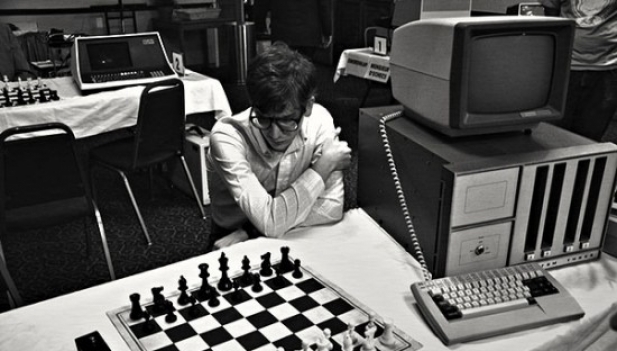What if you were watching a documentary that quietly went to sleep and began dreaming while in the middle of it being watched? Filmmaker Andrew Bujalski’s Computer Chess (2013) feels like that. A film that starts innocuously enough under the most geeky why-am-I-watching-this? of premises, then gradually turns in on itself to become something deeply weird and funny. How could this be described? A vintage sci-fi docu-improv comedy? Viewers who dare approach Computer Chess will have to loosen their habit of comparing and grouping films. Its stubbornly unique and not a film anxious to be approached and appreciated by everybody. It’s a geeky episode of the Twilight Zone as if made by Christopher Guest. Though some audience members might easily argue Guest could’ve made a blatantly funnier film. No one else on the planet beyond Bujalski could have made something like this work.
Set in the early 80’s and framed like a found footage video documentary, Computer Chess drops viewers at a hotel in the middle of a weekend tournament for early computer programmers challenged to write chess software programs. Engineers from Cal Tech to MIT have gathered together for this annual competition of chess-playing software, really early Artificial Intelligence. None of the engineers are actually playing chess per se, but rather writing chess playing software and the competition is to determine who’s written the best. The winner gets a $7500 prize and the opportunity to have their smart software play against a real person— Pat Henderson (deliciously pompous Gerald Peary) who early in the film places a bet that no computer program will beat him until 1984.
The fresh programs make glitchy mistakes during game play that the engineers are constantly tweaking. Henderson, playing host and commentator, does laps around the programmers with his tiny documentary crew. He’s smug, critical, dismissive, arrogant. The engineers, mostly men with the presence of the first-ever lady in the competition, share the hotel’s conference rooms with a new agey encounter couples group, led by a mysterious African dude (Tishuan Scott). The film spends much of its time with one engineer Peter (Patrick Riester) who wanders through the drab hallways of the hotel into a couple of curious micro-stories. Same goes for independent programmer Mike Papageorge (Miles Paige) who is as broke as he is brilliant, ending up without a room and spending the weekend between competitions begging floor space from any and everybody who dares open their door to his lonely knock.
Director of Photography Matthias Grunsky has shot the entire film in black and white on vintage 1980’s video equipment. Between his work and writer/director Bujalski (Frances Ha Ha, Mutual Appreciation), they’ve engineered an aggressively strange film that feels of a different time and space, a 1980’s I recognize, but through the haze of a dream. Its also a world that somehow qualifies as quirky science fiction as much as it does mockumentary. I found myself drawn through memory by the films weird texture and the presence of ancient computer processors and monitors. Certainly the elements assembled here sound aggressively anti-audience pleasing: black and white video, chess, computer programming, a weekend of engineers and couples therapy. Though my experience—when I got to the end of the dvd, I found myself re-watching it backwards, skipping back a chapter a time. This weird experimental movie charmed me. The performances felt equally natural and grounded in a quirky, off-centered way. And the soundtrack too, much of it sung by 1970’s folk artist Collie Ryan, is hauntingly gorgeous. It’s a film I admire for its time-travelling magic trick, though I’m hard pressed to suggest it to anyone. Its a film about loneliness and the struggle to connect moreso than its about computer programming or chess. The man who taught me to play chess would probably complain there’s not enough chess in it, even as we meet characters that represent chess pieces and their movements. In one of Roger Ebert’s final reviews, he shrugged Computer Chess off as laudable if missable. The Dissolve praised it with its highest rating. I’m in the middle—It’s a joke only few in the room will get but if they get it, they’ll love it like nothing else.

